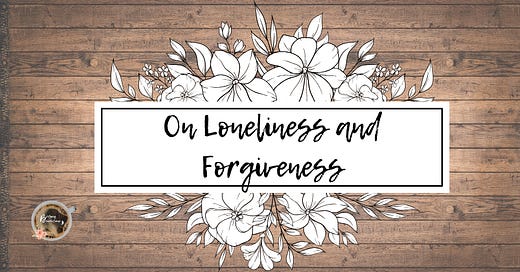On Loneliness and Forgiveness
This morning, as I was praying through my daily liturgy, one quiet line reached out and wrapped around my heart:
“You hear me, and in Your goodness, always respond to me.” – Litany of Trust
In a world full of noise, how often do we feel unseen, unheard—even by God?
David knew that feeling well. In Psalm 142, while hiding in a cave and fearing for his life, he wrote:
“No one cared for my soul.” (Psalm 142:4)
How many of us have whispered those same words into the silence?
Even in our hyper-connected digital world, loneliness is an epidemic. But just as God heard David’s cries, He hears ours, too. As David wept, God was already at work—moving over 400 people, including David’s family, to come to him. While David feared abandonment, God was orchestrating rescue.
God always hears. God always responds.
Not always as we expect—but always in love, and always with our restoration in mind.
Forgiveness: A Pathway to Connection
This morning’s reading from George MacDonald’s Unspoken Sermons also echoed this theme. The chapter, “It Shall Not Be Forgiven,” might sound heavy—but its heart is surprisingly tender.
MacDonald explores two sins the Bible calls “unforgivable”:
The refusal to forgive others
The rejection of the Holy Spirit
Let’s start with forgiveness. Refusing to forgive severs our connection with others—and with God. Bitterness builds walls around our hearts and eats at us like a cancer, locking us in pain and isolation. If we don’t forgive, we cannot be forgiven. It’s as simple as that.
Forgiveness isn’t ignoring the hurt. It’s acknowledging it, then choosing love over resentment. MacDonald puts it this way:
This kind of love disarms the darkness. It opens the door to healing, for us and for others. Sometimes, full reconciliation isn’t possible. Others may not always want it, even if we do. If reconciliation isn’t possible, we can still forgive on our side and choose peace—and by doing so, draw nearer to God, who sees and responds to our willingness to love.
The Unforgivable Sin and the Holy Spirit
The second “unforgivable” sin is rejecting the Holy Spirit. Not because God won’t forgive—but because we choose not to receive.
God plants a desire for truth in every one of us. But if we knowingly turn from that truth—if we silence the Spirit within us and cling to falsehood for comfort or control—we disconnect ourselves from the Source of all goodness.
We are called to seek the truth; if something we are taught, something we hear, or something we read doesn’t line up with what we know to be the characteristics of the Holy Spirit, it is our duty to question it! Luke warns us of blindly following the teachings of authority without discerning truth:
“Why, even of yourselves, do you not judge what is right?” —Luke 12:57
When we fail to seek the truth, or when we intentionally turn away from it, we are turning away from the Holy Spirit. We are cutting ourselves off from the love and connection we so desperately need.
Yet even then, we’re not outside of His reach.
MacDonald writes:
God’s Consuming Fire
God’s love is a consuming fire. It may burn away pride, hate, and fear—but never us, never who we truly are. This burning fire may be uncomfortable, or even painful, but only by enduring the consuming fire of His love are we made whole in Him.
“For our God is a consuming fire.” – Hebrews 12:29
The consuming fire of God is not for destruction, but for purification. Through that fire, we are refined, not rejected. Loved, not lost.
When You Feel Most Alone
When loneliness creeps in, it isn’t a dead end—it’s an invitation. A chance to cry out like David did. A moment to reach for the One who is always reaching back.
God is our refuge. His arms are always open. And when we forgive, when we love, when we turn back to Him—there is nothing too broken for Him to forgive and restore.
Nothing is unforgivable through Christ.
He has made all things new. And He will make you new, too; all you need to do is reach out.
So, if you’re feeling alone today, let me gently remind you:
You are not alone.
You are seen.
You are heard.
You are loved—now and forever.
With love in Christ,
Cat Goyer




